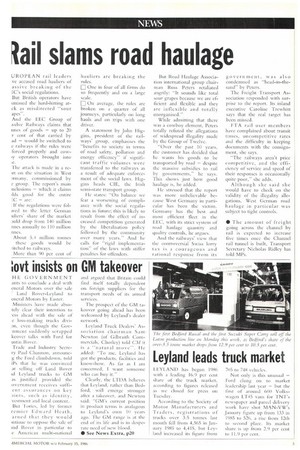tail slams road haulage
Page 3

If you've noticed an error in this article please click here to report it so we can fix it.
LIROPEAN rail leaders ye accused road hauliers of assive breaking of the BC's social regulations.
But British operators have smissed the hard-hitting atck as misdirected "sour apes".
And the EEC Group of xelve Railways claims that nnes of goods — up to 20 r cent of that carried by ad — would be switched to e railways if,the rules were forced properly and cowoy operators brought into
• Ihe attack is made in a re • rt on the situation in West mnany, commissioned by e group. The report's main nclusions — which it claims Ids good for the entire — are:
If the regulations were Colwed to the letter German uliers' share of the market Duld drop from 140 million rules annually to 110 million rines.
About 5.4 million tonnes these goods would be ,itched to railways.
More than 90 per cent of hauliers are breaking the rules.
0 One in four of all firms do so frequently and on a large scale.
0 On average, the rules are broken on a quarter of all journeys, particularly on long hauls and on trips with one driver.
A statement by John !figgins, president of the railways' group, emphasises the "benefits to society in terms of road safety, pollution and energy efficency" if significant traffic volumes were transferred to the railways as a result of adequate enforcement of the social laws. Higgins beads CIE, the Irish semi-state transport group.
He states: "On balance we fear a worsening of compliance with the social regulations in future; this is likely to result from the effect of increased competition generated by the liberalisation policy followed by the community over many years." And he calls for "rigid implementation" of the laws with stiffer penalties for offenders. But Road Haulage Association international group chairman Russ Peters retaliated angrily: "It sounds like total sour grapes because we are efficient and flexible and they are inflexible and totally unorganised."
While admitting that there was a cowboy element, Peters totally refuted the allegations of widespread illegality made by the Group of Twelve.
"Over the past 10 years, the customer has decided that he wants his goods to be transported by road — despite the massive subsidies to rail by governments,he says. This shows just how good haulage is, he added.
lie stressed that the report was more unbelievable because West Germany in particular has been the victim. Germany has the best and most efficient fleet in the EEC, with its strict system of road haulage quantity and quality controls, he argues.
And the railways' view that the controversial Swiss lorry tax is a courageous and rational response from its government, was also condemned as "head-in-thesand" by Peters.
The Freight Transport Association responded with surprise to the report. Its inland executive Caroline Trewhitt says that the real target has been missed.
FTA rail user members have complained about transit times, uncompetitive rates and the difficulty in keeping documents with the consignment, she says.
"The railways aren't price competitive, and the efficiency of service and speed of their responses is occasionally quite poor," she adds.
Although she said she would have to check on the validity of the illegality allegations, West German road haulage in particular was subject to tight controls.
• The amount of freight going across the channel by rail is expected to increase five times once the Channel rail tunnel is built, Transport Secretary Nicholas Ridley has told MPs.






















































